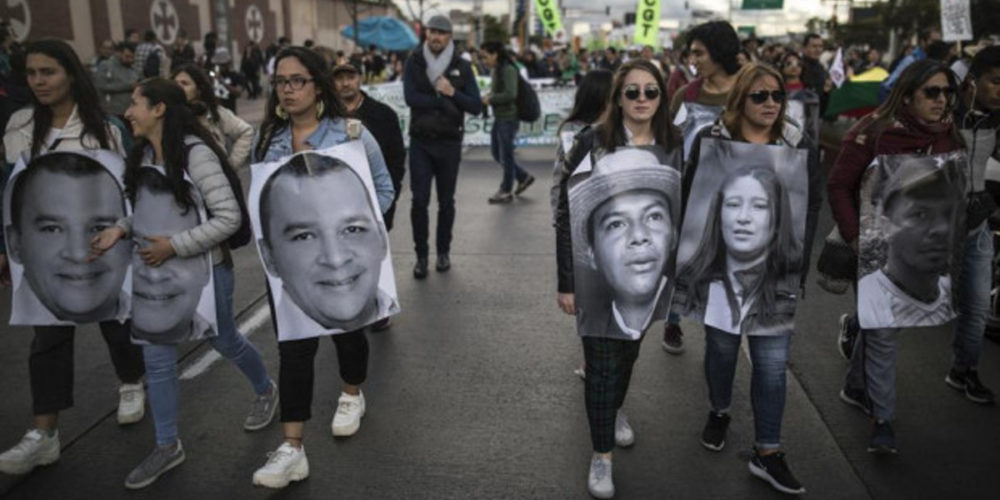The long war in Colombia originated in the countryside, from the state oppression of the peasants and the continuing drive of the large landowners (latifundistas) to enlarge their landholdings at their expense, using paramilitary gangs to terrorise the people. The Fuerzas Armadas Revolucionarias de Colombia (Revolutionary Armed Forces of Colombia) began in Marquetalia, in the south of the country, in 1964, consolidating the resistance and developing into a powerful force.
In September 2016, after four years of protracted negotiations in Havana, the Colombian government and FARC signed an agreement to bring the fifty-year armed conflict to an end. This agreement was vociferously opposed by ex-president Álvaro Uribe and his ultra-right party (amusingly called the Democratic Centre), and was narrowly defeated in a referendum. Their candidate, Iván Duque, was elected president in 2018. In November an amended version, with concessions by the FARC, was passed by the Congress and entered into law.
During the war the state and the ruling class made use of paramilitary gangs that assassinated left-wing politicians and social leaders and massacred peasants who were trying to protect their land from big landowners or transnational agribusiness corporations. This violence especially affects the indigenous population. These gangs were, and are, also the main organisers of the production and distribution of cocaine.
Since the peace agreement the paramilitary gangs have actually stepped up their activities. Up to 8 September, 151 ex-combatants of the FARC and 666 social leaders have been assassinated. Especially targeted is the movement for the replacement of illicit crops with normal agriculture.
The murder of Alexander Parra brings the number of ex-combatants murdered to 168. He was the representative of the political party FARC (Alternative Revolutionary Front of the Common) in the process of reintegrating FARC soldiers in civil society. He was killed in the centre for reintegration, which was supposed to be protected by the state as part of the agreement.
The government denies the existence of paramilitaries, referring to “dark forces” or “criminal bands” as the perpetrators of these crimes. Not so the paramilitaries themselves. The “Águilas Negras” (Black Eagles) openly boast about their activities and habitually send out death threats.
Since the government collaborated with the “Rastojos” gang in smuggling Juan Guaidó across the border with Venezuela, it is not too serious about suppressing them. Duque, of course, gives unconditional support to Guaidó, and Colombian paramilitaries have aided Venezuelan landowners by murdering peasant activists there.
Such is the frustration at the non-compliance with the peace agreement, especially with the murder campaign, that the leaders of the FARC negotiating team, Iván Márquez and Jesús Santrich, have decided to “go back to the mountains” and resume the armed struggle—a decision that was repudiated by the leaders of the FARC party, Rodrigo Londoño and the late Alexander Parra. The peace movement carries on bravely as before, trying to pressure the government into implementing the agreement.
Two brave representatives of Colombian women’s organisations recently spoke in Dublin. Claudia Mejia of the organisation Sisma-Mujer and Maria Eugenia Diaz Alarcón, representing women human rights defenders, gave an account of the continuing non-compliance and sabotage of the agreement. They explained that the peace agreement paid special attention to women’s rights and safety, for the first time in history in a deal of this nature; yet women activists and women’s organisations have been targets of the paramilitary campaign, subjected to sexual violence and murder.
Local elections have just been held in Colombia. They are already surrounded by controversy, with allegations of vote-buying and other malpractices. The Movement for Electoral Observation reports some hundreds of violations; there were even some arrests for vote-buying operations. More seriously, in the period before the elections seven candidates were killed.
Even so, anti-government candidates won some important positions, including those of the mayor of Bogotá and Medellín. The election is regarded as a big defeat for Duque, Uribe, and the “Democratic Centre.”
The protagonists of the peace process will take heart. They will push harder for its implementation; but it will be a long and difficult struggle.






